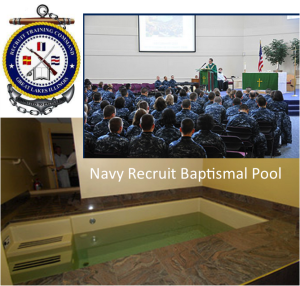Navy Basic Training Shuts Out Religious Diversity
The Navy has taken another step backward in terms of religious diversity. Recent reports, verified independently by MAAF, show that Great Lakes Training Center, Navy Basic Training, has turned away all civilian religious program volunteers. This means that those personnel not privileged enough to have a chaplain on the installation are potentially deprived of the best support available to them.
The National Conference on Ministry to the Armed Forces (NCMAF) has sent a letter to Adm Kibben, Chief of Navy Chaplains (full document currently embargoed pending response), calling for her to intervene. “[W]e are deeply disturbed by confirmed reports of the loss of Sailors’ protected religious freedoms… What we find particularly difficult to comprehend is why lay-led services, some in existence for many years, were summarily discontinued.” It is a good sign that NCMAF has stepped in in defense of volunteer support for minority beliefs.
MAAF hopes all of these religious programs are restored and hopes to provide services to humanist trainees as well. The military currently provides no invitation to support or avenue to connect with humanist trainees despite the knowledge that humanist and other nontheist trainees could benefit. MAAF already supports a successful non-chaplain humanist program at Air Force Basic Training, with over 100 trainees participating every weekend. Volunteers stand ready to support Great Lakes trainees as well, when the Navy opens its doors to humanist diversity of belief.
Originally brought to light by the Military Religious Freedom Foundation, this denial of services at Great Lakes has drawn attention as a blow to diversity and to those trainees who benefitted from civilian volunteers. The Navy Times reports that the command relied on Navy policy which states “a uniformed chaplain or a religiously accredited military member should conduct the service before the service pursues other avenues.” There is no indication that services are continuing under the direction of accredited military personnel. In any case, a military member who is already working a full time, stressful military job would very likely not be a better option than a civilian volunteer or civilian clergy able to dedicate their full attention and presumably greater expertise in the religious area to the effort.
This opposition to diversity is one more step backward for diversity of belief in the Navy and the DoD. The Navy is currently being sued by a humanist chaplain candidate the Humanist Society for their denial of his application to serve as a chaplain. Despite two Masters Degrees in Divinity and Religious History, his civilian ministry experience, and the lack of any humanist-endorsed chaplains in the Navy, he was turned away. Lay leaders endorsed as humanists, those military personnel who could serve, are also being turned away by Navy and other military service leaders. The Department of Defense, whose greatest diversity was previously a Hindu chaplain immediately changed laws to increase barriers to diversity in chaplaincy and that Hindu chaplain has since left the service. The chaplaincy still maintains demographics where 66% of the chaplaincy represents evangelicals who are under 20% of the population. At Great Lakes, this lack of diversity in the chaplaincy is playing out with policies that further shackle those whose beliefs don’t conform to what the Navy deems “acceptable.”
There is certainly more to this developing story. And this issue could theoretically be resolved very easily. According to the Navy Times, denominations affected include, “Unitarian Universalist, earth-centered, Buddhist, Baha’i, Church of Christ, Christian Science and non-liturgical Protestant.” The question is what “uniformed chaplain or a religiously accredited military member” will ensure EACH of these services are again available to trainees. Until services are restored, religious freedom is being denied.

